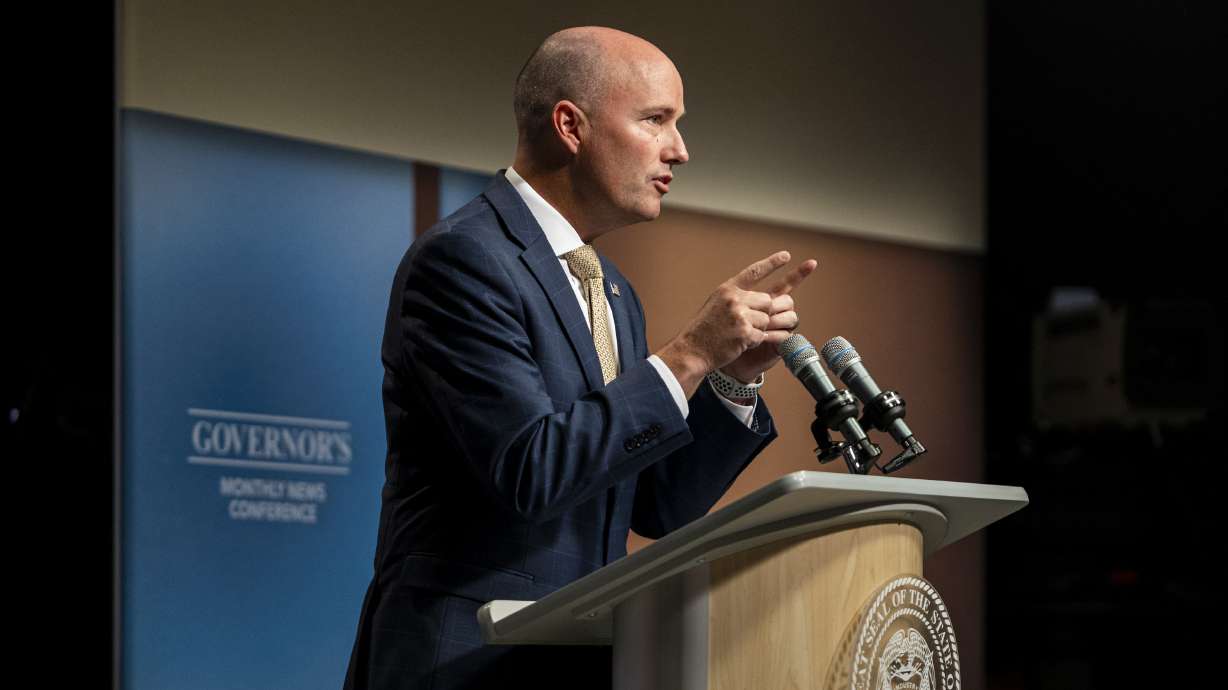Estimated read time: 3-4 minutes
This archived news story is available only for your personal, non-commercial use. Information in the story may be outdated or superseded by additional information. Reading or replaying the story in its archived form does not constitute a republication of the story.
- Gov. Spencer Cox, along with 24 other Republican governors, is urging President Joe Biden to provide more transparency regarding a humanitarian parole program.
- The program is geared to Venezuelans, Haitians, Nicaraguans and Cubans, and "based on significant public benefit or urgent humanitarian reasons."
- The governors argue that the unexpected influx is straining local services, causing fear among the public and posing potential risks to the immigrants.
SALT LAKE CITY — Utah Gov. Spencer Cox and 24 other Republican governors are pressing President Joe Biden to release more details about the population of Venezuelans, Haitians and others allowed into the United States under a federal humanitarian parole program.
The call, made in an open letter Tuesday, comes amid ongoing concern, particularly among Republican lawmakers, about the population of immigrants in the country and, more specifically, the disruption the governors fear the newcomers are causing.
"The impact of this 'parole' process has been a sudden influx of foreign nationals throughout our states and communities. The unexplainable lack of any communication from your administration over arrival times, duration of residency, legal status and location of these 'parolees' has created considerable confusion and alarm among local officials and the general public," reads the letter.
Lacking information from the U.S. Department of Homeland Security, local officials and law enforcement rely on "news reports and social media posts" to assess the potential size of incoming migrant pools and the possible impact they may have on "already limited government services, including local public schools," the governors wrote.
The parole program in question, administered through U.S. Citizenship and Immigration Services, or USCIS, is geared to Venezuelans, Haitians, Nicaraguans and Cubans. The U.S. government may allow as many as 30,000 per month total from the four nations to travel to the United States to seek parole under its parameters though guidelines apply. Granting of parole is "based on significant public benefit or urgent humanitarian reasons," among other factors, according to the USCIS website. Moreover, would-be participants face "public safety" vetting and must have a supporter in the United States, who also faces scrutiny to make sure he or she is able to provide financial support.
Still, Cox and the 24 other governors say the entry of the newcomers is problematic, causing "fear" in the public and potentially placing the parolees themselves in harm's way. Through the end of August, nearly 530,000 people from the four countries were granted parole status under the program, created on Jan. 5, 2023. Over the summer, Utah was impacted, most notably by an influx of immigrants from Venezuela, according to government leaders and social service providers, who said they were overwhelming the state's homeless shelters.
"The apparent dumping of migrants into our cities and small towns with no advance notice has not only sowed mistrust and fear among the public, but it has also placed the migrants themselves at potential of physical harm," reads Tuesday's letter, directed both to Biden and Vice President Kamala Harris, the Democratic presidential hopeful.
"After being met with understandable skepticism from the communities in which they are now living, migrants have become fearful to interact with the public. This isolation has created a ripe environment for their exploitation and abuse," the letter continues.
The governors call on the Biden administration to provide the state officials with the parolees' locations, details about the security vetting they faced and the names and locations of the parolees' sponsors. "We also ask what system DHS has in place to monitor migrants and their sponsors and what assistance DHS is providing migrants," reads the letter.
Under the Department of Homeland Security program, eligible citizens from Cuba, Haiti, Nicaragua, and Venezuela are granted parole in the United States for up to two years and may apply for employment authorization.
After that, they may pursue "a full range of existing lawful immigration pathways," according to U.S. Citizenship and Immigration Services. Those include applying for an extension of parole, immigrant and nonimmigrant visas, asylum or "temporary protected status," applicable under certain circumstances to people from countries facing an environmental disaster or mired in conflict, among other things.









